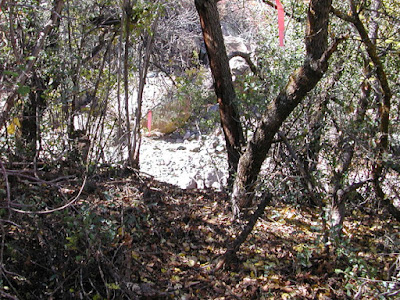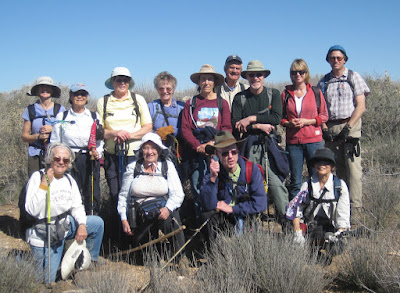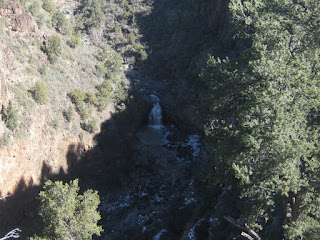A
hiker from Sedona who claimed to know how to reach the site of the
Vultee plane crash by way of A.B. Young Trail, agreed to lead a hike
to it. Having long been somewhat curious as to exactly where the
plane crashed and not having hiked A.B. Young since October 2009, we
scheduled a hike for 27 February 2013.
 On
the appointed day, we traveled north on 89A through Sedona and parked
alongside the highway about 150 yards north of the entrance to
Junipine Resort (located about half way between mm 382 and 383).
We walked back to the resort entrance and proceeded on the main road
through the resort for about 100 yards until we came to a small sign
pointing to a walkway leading down toward the “creek.” The
photograph shown here (right)
shows Dolly Yapp emerging from the walkway on a 2009 hike.
On
the appointed day, we traveled north on 89A through Sedona and parked
alongside the highway about 150 yards north of the entrance to
Junipine Resort (located about half way between mm 382 and 383).
We walked back to the resort entrance and proceeded on the main road
through the resort for about 100 yards until we came to a small sign
pointing to a walkway leading down toward the “creek.” The
photograph shown here (right)
shows Dolly Yapp emerging from the walkway on a 2009 hike.
The
walkway brought us out on a street below headed directly to a bridge
crossing Oak Creek. The bridge is shown below in a 2009 photograph.
 |
Bridge across Oak Creek at Junipine Resort – October 2009
|
Directly
across the bridge an unnamed trail leads upstream along the bank of
Oak Creek to A B Young Trail, about 0.42 miles ahead. The trail sign
shown here (left) points out
the start of this trail. The photograph was taken on our October
2009 hike.
As
we walked upstream alongside Oak Creek, we noted the remains of an
old irrigation system. In places along the trail, we encountered
communications cables strung on short poles over the trail, in some
areas low enough that one needed to duck to avoid touching them. I
call them communications cables because I assume that no one would
install power cables so low along the trail.
 The
junction with A B Young Trail was clearly marked when we came to it.
In the photograph shown (right)
here the trail leads to the left up the mountain. The trail leading
to the right continues along Oak Creek to a very difficult crossing
at a parking area alongside 89A. We crossed there to hike on this
trail several years ago.
The
junction with A B Young Trail was clearly marked when we came to it.
In the photograph shown (right)
here the trail leads to the left up the mountain. The trail leading
to the right continues along Oak Creek to a very difficult crossing
at a parking area alongside 89A. We crossed there to hike on this
trail several years ago.
An
old, rusty metal sign, barely visible in the top of the above
photograph, reassures the hiker of being on the right trail. To this
point, the hike has been along a relatively level trail. It now
starts to climb, at first rather gently, rising some 200 feet in the
next two-tenths of a mile. After that it rises very rapidly along a
series of switchbacks to the top of the mountain.
We
made our way up the switchbacks, pausing occasionally for a breather
and soon were high enough that we had excellent views down into Oak
Creek Canyon. The following two photographs will serve to display
the view and to contrast the differences between what we saw on this
February hike and our October 2009 hike.
 |
Oak Creek Canyon from A.B. Young Trail in February 2013
|
 |
Oak Creek Canyon from A.B. Young Trail in October 2009
|
When we arrived at the
top of the mountain we found about 18 inches of snow on the ground
and I began to doubt that we would find the wreck site. Even finding
the trail, now obscured by the relatively undisturbed snow, was a bit
difficult in places. Nevertheless, we pushed on, climbing the
relatively gentle slope to the crest of East Pocket Knob where the
tower is located.
On reaching the tower,
I noted that considerable work had been performed on it since 2009.
It was not manned at the time of this visit; however, we were able to
climb most of the way up (only the top level was locked) to get a
better view of the surrounding area. Going on past the tower for a
hundred yards or so, we found picnic tables and benches placed at the
end of Forest Road 231. I paused there and sat on one of the tables
to look back and photograph the tower.
 |
East Pocket Lookout Tower – February 2013
|
The wreck site is said
to lie down the slope to the southwest of the tower and, along with
the rest of the party, I did go a short distance in that direction.
But it was immediately obvious to me that, with landmarks obscured by
the snow and no specific coordinates for the location, we would never
find it. I decided to save the search for a summer day on which I
could drive in on Forest Road 231, perhaps stop for a picnic, and do
a more leisurely search.
I turned back to the
picnic tables and just enjoyed the scenery while I waited for the
other members of the party to return. Looking up, I found that
barren tree branches above me were most attractively outlined against
the blue sky and took several photographs of them. The one I like
best is shown below.
 |
Barren branches against the sky
|
Even though I was
surrounded by snow, the sun was warm and I began to think of a
noontime nap. Looking around, I found a nice pile of broken tree
limbs and other debris that had been cleared from the picnic area and
managed to make myself a rather comfortable nest in it. That is
where I remained until the rest of the party returned.
We all agreed that a
summer expedition to find the crash site would be more appropriate
and headed back down the trail, pausing along the way at the
“throne.” This is actually nothing more than a stump where a
tree was cut down and fell before being sawed all the way through.
The unsawed part of the trunk split away and left a shaft of wood on
the stump extending several feet above it. The stump with that shaft
of wood still standing makes a good chair, or “throne.” We
stopped and coaxed Mary onto the “throne.” George immediately
declared her Queen Mary and proclaimed himself to be a knight of her
realm.
 |
“Queen Mary” and “Sir” George
|
The elevation gain for
this hike from Oak Creek to the lookout tower on East Point Knob was
just over 2100 feet. The total hiking distance from where we parked
to where I gave up searching for the crash site was 3 miles, making
my round trip hike 6 miles.
Our GPS track is shown
in red on the included map (below).
Participating in this
hike, in addition to the author, were: Frank Lombardo, Becky Fowsky,
Mary Gavan, George Everman and Jim Manning.










































